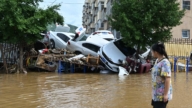【新唐人2013年08月17日讯】最近有海外媒体指出,相对中国制造业增长放缓或者房地产价格泡沫化等经济危机来说,中国面临的最大危机是水危机,并且这种危机正在影响亚洲其他国家,甚至波及世界。那么,到底中国的水危机有多严重,是怎样造成的,为什么水危机和经济危机能扯到一起,我们来看看专家分析。
来自道钟斯公司的这篇文章,美国《华尔街日报》在7月最后一天发表了。文章引用美国外交关系协会亚洲部门负责人伊科诺米(Elizabeth Economy),上周向美国参议院发表的证词说,中国正面临水危机,这种危机可能会在中国引发健康危机,并使中国与邻国产生直接冲突。
文章认为,工业是水危机的罪魁祸首。中国工业的单位GDP用水量是同类经济体的4到10倍,而且工业正在以令人担忧的速度污染着中国的现有水资源。
中国地质调查局2013年2月份的一份报告指出,中国90%的地下水受到污染,中国主要水系约25%的水污染太过严重,甚至无法用于工业或者农业。
文章中还引用中国水资源官员的话说,去年超过400个中国城市缺水,其中110个城市严重缺水。
地质专家范晓:“水资源短缺,一方面是污染造成的,使得可用的水不够,另外一个是对水资源的开发模式造成的,特别是49年以后,我们的基本思路是以需定购,而且工程至上,49以后,中国搞了很多这样的工程,包括现在还在做的。”
而水资源是有限的自然资源,并不是按照人的需要来提供的。大量工程的建设,虽然能让GDP好看,但对人力物力财力的消耗,以及对生态的破坏都不可忽视,上游水库的建设导致下游在枯水期严重缺水,造成鱼类大量死亡。
四川地质局地质调查队总工程师、地质专家范晓指出,现在这种南水北调的思维模式,建多少工程也解决不了问题。范晓说,应该根据水资源的容量来建立一个节约型的社会,根据环境容量来考虑建多少污染性的产业。
对节约用水的宣传教育,技术开发及政策引导,不会很快的看到成效,也不会对GDP产生直接的影响,但对水资源来说却是一种可持续的利用方式。
范晓:“(当局)不考虑水资源量,不考虑环境容量,在城市发展,工业发展,很多的工程里面,它只考虑短期的跟政府有关的经济利益,对整个社会来说,对民众来说,都会受到影响的,另外大量施用化肥农药,它不是更多的去考虑做生态农业绿色农业。”
城市的污水治理同样重要,一味的进行城镇化建设更会恶化水资源。
伊科诺米(Elizabeth Economy)还告诉美国议员,中国的自来水大多不适宜饮用,饮用这种水的人会有患重大疾病的风险。而且水污染正在进入食品系统,导致出现镉污染大米等的威胁。
文章中还说,中国控制着亚洲多个重要水系的源头,比如额尔齐斯河、湄公河和雅鲁藏布江,随着中国在上游制定的计划,可能会对下游水域产生严重影响,使得地区紧张关系日益加剧。
范晓:“沿海地区的污染,特别是一些国际河流,像雅鲁藏布江、澜沧江、怒江,中国境内的环境不注意,当然会对下游产生影响,而且西部地区都在做梯级水电开发,把整个自然河流全部变成人工水库,一方面对生态环境有影响,另外对水资源的分配也会产生很大影响。”
中华经济研究院研究员吴惠林:“一味的追求GDP的成长,这样一种发展方式,使得中国大陆的宝贵资源耗用殆尽,用完了就用全球的资源,使得整个气候也受到影响。”
中华经济研究院研究员吴惠林教授表示,作为研究人员,他们十几年前就指出了这个问题,现在只是更多的人达成了共识,但是要想改变局面,必须在没有共产党的体制下,改变经济模式才能实现。
另外有报告指出,中国的土地污染同样严重,中共官员的掩盖导致污染不断扩散。一些研究人员和环保活动人士警告说,污染对当前政权的存在造成威胁,对于中国共产党未来能否保持其合法性,污染可能是最为重大的决定性因素。
采访编辑/刘惠 后制/王明宇
Pollution and Water Resources Threaten Chinese Communist Regime
Recently, overseas media revealed
that China is facing a serious problem.
This problem is bigger than the slowdown in the
growth of manufacturing or the housing-price bubble.
It is the problem of water, and it’s a potential catastrophe
that could affect the rest of Asia, and the wider world.
What is the cause of China’s water crisis? How serious is
it? Why is the water crisis linked with the economic crisis?
Let’s take a look.
On July 31, the Wall Street Journal published an article.
It cited Elizabeth Economy, Director of Asia
Studies at the Council on Foreign Relations.
In a testimony to the US Senate last week,
she said that China is facing a water crisis.
This crisis may be a health crisis in China,
and cause outright conflict with its neighbors.
Elizabeth Economy highlighted that the key culprit is industry.
It uses 4 to 10 more water per unit of
GDP compared with similar economies.
It is also polluting the nation’s existing
water resources at an alarming rate.
She cited a February 2013 report
by the Geological Survey of China.
It stated that 90% of the country’s groundwater was polluted.
The water from about 25% of China’s major
river systems were so filthy that it couldn’t
be even used for industry, nor for agriculture.
She cited China’s own water-resource officials.
They stated that over 400 Chinese
cities lacked enough water last year.
110 of those were facing “serious scarcity” of water.
Fan Xiao, Geological expert: “Water
shortages are partly caused by pollution.
This leads to insufficient drinkable water. The model
for water resource development also caused problems.
This is especially after 1949, where the basic policy
was to purchase water according to requirement.
China had launched many of these
projects, which still continues now.”
The water is a limited natural resource and
is not provided according to people’s needs.
A large number of projects can
make GDP look good on the surface.
However, the consumption of human resources and
materials, as well as ecological damage cannot be ignored.
Construction of an upstream reservoir causes
downstream drought and severe shortages of water.
This results in a mass death of fish.
Fan Xiao comments that the current methods of the South
North Water Transfer Project can’t solve the problem.
This is regardless of how may projects are launched.
We need to create a society that conserves water according
to resources and builds industry to environmental conditions.
Regarding education on developing water-saving technology
and guidance of policies, results won’t be seen instantly.
It won’t directly affect GDP, but it helps
to sustain the use of water resources.
Fan Xiao: “The authorities didn’t consider
the capacity of water resources.
Nor did they consider the environmental conditions.
During development of urban, industrial and other
projects, they only considered quick interest gains.
It will affect the entire society and the public.
In addition, great amounts of fertilizer and pesticides are
used, without considering ecology or green agriculture.”
The city’s sewage treatment is equally important.
To blindly develop urbanization will deeply
worsen the problem of water resources.
Elizabeth Economy states in the testimony to the US
Senate that China’s tap water is mostly undrinkable.
Those who do drink it run major health risks.
Contamination is making its way into the food chain,
resulting in cadmium-tainted rice, as well as other threats.
She comments that China controls the headwaters
of many of Asia’s most important rivers.
This includes the Irtyush, Mekong, and Brahmaputra.
This is raising regional tensions, as China
develops plans upstream that may have
dramatic impacts on the lower reaches.
Fan Xiao: “Coastal pollution is a problem, especially
in some international rivers, like the Brahmaputra
River, Lancang River and Nujiang River.
Environmental issues within the territory
of China that haven’t been taken care of
will certainly affect areas further down river.
Western regions of China are engaging
in economic hydropower development.
All the natural rivers were
turned into manmade reservoirs.
It affects the ecological environment
and distribution of water resources.”
Wu Huilin, Researcher at Taiwan’s
Economic Research Institute:
“Blindly pursuing GDP growth is making
Mainland China’s resources deplete.
When China runs out its own resources,
it will use the rest of the worlds.
It also affects climate change.”
Wu Huilin said that researchers have
raised these issues a dozen years ago.
Now more people have reached a consensus.
However, to change the situation, we
must change the model fundamentally.
Removing the Chinese Communist Party (CCP) system,
will allow the correct economic model to be achieved.
Sources report that China’s land
contamination is also serious.
It is covered up by CCP officials, which
causes pollution to continue to spread.
Some researchers and environmental activists warned
that the pollution brings a threat to the current regime.
Pollution may become a pivotal factor in determining
whether the CCP maintains its legitimacy in the future.






























